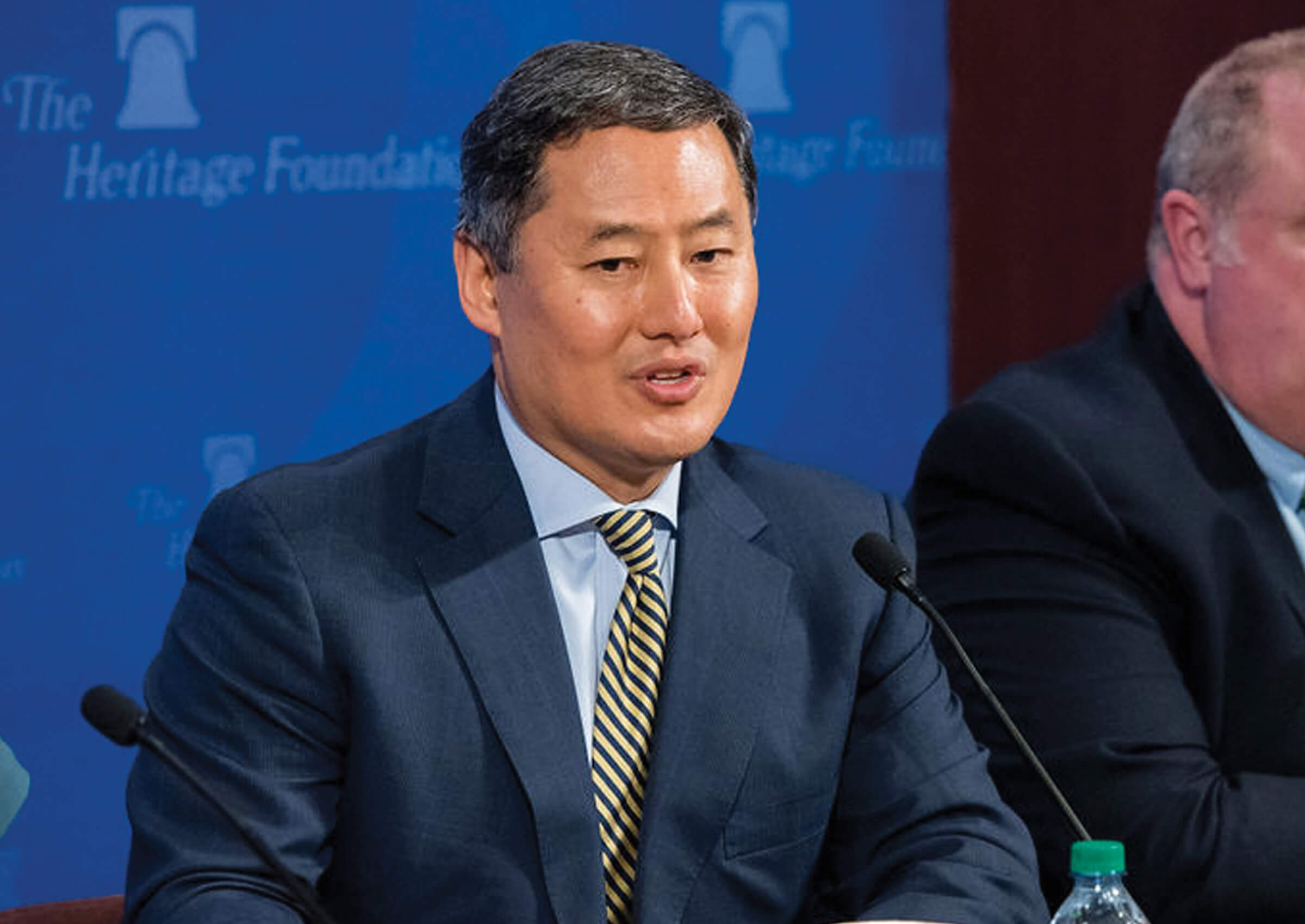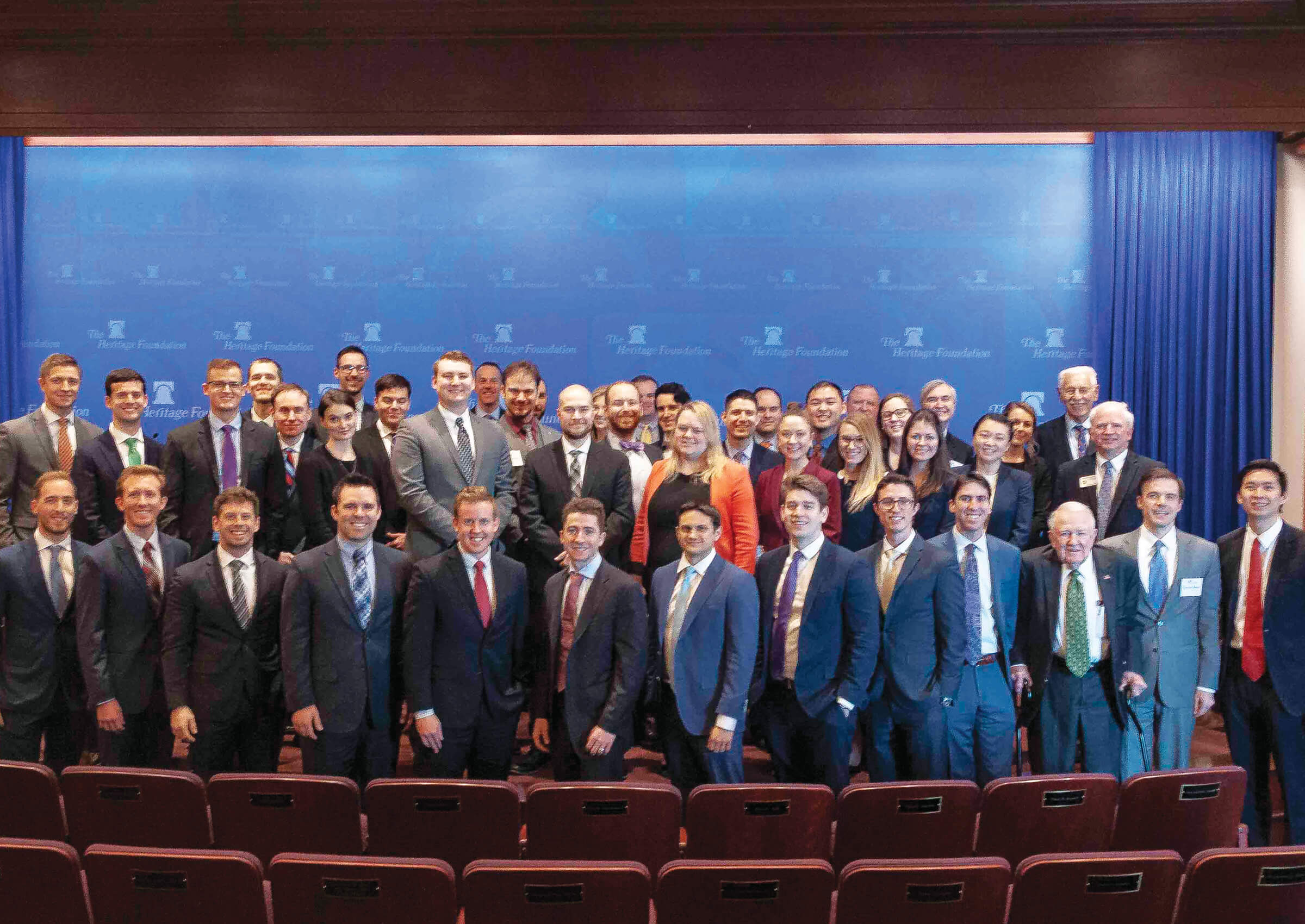2019 Annual Report
Principled Leadership in a Challenging World
The Institute for Constitutional Government
Amy Swearer
Senior Legal Policy Analyst
Follow: Twitter
Throughout 2019, gun control advocates insisted that lawmakers “protect life” by enacting ever-more-stringent restrictions on the right to bear arms.
Often, they buttressed their emotion-laden arguments with false or misleading information. Experts in our Edwin Meese III Center for Legal and Judicial Studies resolved to make sure lawmakers—and the public at large—had accurate and complete information before reaching any decisions about pending legislation. At the forefront of that effort was Amy Swearer.
A senior legal policy analyst, Swearer’s specialty area is the Second Amendment and firearms policy. Writing extensively on the gun control debate, she produced a series of fact sheets and articles on topics ranging from mass shootings to red flag laws to the defensive use of firearms. She teamed with Vice President John Malcolm to produce a three-part series of essays exploring the intersections of mental illness, violence, and firearms.
Swearer also started writing a monthly column for The Daily Signal, Heritage’s multimedia news outlet. Each installment recaps 10 or more new incidents in which armed citizens have stopped criminal violence or neutralized threatening situations. Such “good guys save lives” stories are often ignored by liberal media outlets and are seldom mentioned by activists pushing gun control.
“Firearms can be used to carry out horrific acts of violence,” Swearer notes, “but the vast majority of gun owners will never use their firearms for unlawful purposes. In fact, lawful gun owners are much more likely to use their firearms for self-defense than criminals are to use firearms to harm innocent people.”
In August, not long after a deranged gunman killed 12 and injured four at a public works building in Virginia Beach, Swearer was called to testify before the Virginia State Crime Commission. She opened her remarks by debunking the notion that America is gripped by a crisis of “gun violence.”
“Americans are safer today from violent crime—including firearm-related crime—than we have been at any point during my lifetime,” she stated. “And while the number of guns in this country has increased by about 50 percent since the early 1990s, the rate of homicide and gun-related homicide has fallen by about 50 percent.”
Swearer brought her reasoned approach to the gun debate to many national news outlets, from NPR and FOX Nation to the “Dr. Oz Show.” But her biggest appearance of the year came in September, when she testified before the House Judiciary Committee.
“Americans use firearms to defend themselves between 500,000 and 2 million times every year,” she informed the committee. “God forbid that my mother is ever faced with a scenario where she has to stop a threat to her life. But if she is, I hope politicians protected by professional armed security didn’t strip her of the right to use the firearm she can handle most competently.”
BlazeTV summarized the hearing this way: “Dems Sit in Silence as Witness Debunks Their ‘Assault’ Rifle Lies.” By year’s end, YouTube users had watched her opening statement well over 1 million times.
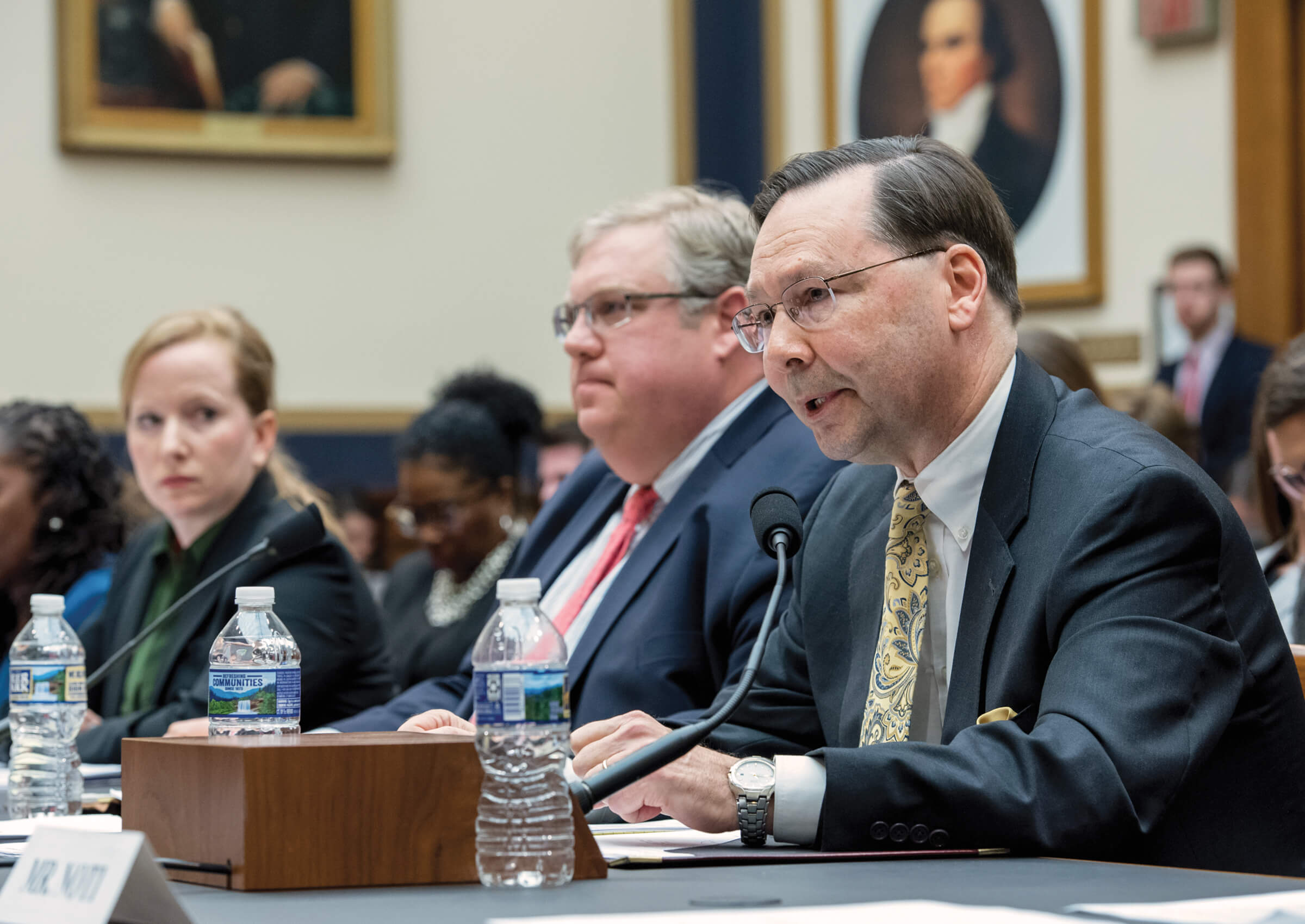
Heritage Senior Legal Fellow Hans von Spakovsky (right) testifies before the House Judiciary Committee in January on the dangers of a “reform” bill that would have inhibited political speech and undermined election integrity.
The Heritage Judicial Tracker has come to be relied upon by media organizations and members of Congress of all political stripes.
Fighting to Preserve Election Integrity
The Left is so invested in the “voter suppression” myth that the first bill produced by the liberal House majority was the inaptly named “For the People Act.” Though marketed as a measure to expand voting rights, strengthen ethics rules, and limit the influence of money in politics, the bill, H.R. 1, would have actually made it easier to restrict political speech and commit election fraud.
The very day the bill was introduced, our Meese Center issued a fact sheet analyzing the real-world effects it would produce and briefed members of the House Freedom Caucus, the Republican Study Committee, and the House Republican Conference.
The head of our Election Law Reform Initiative, Hans von Spakovsky, later testified before the House Judiciary Committee about the problems the bill would create. He also spoke against it strongly in numerous radio and TV interviews.
When the bill came to the House floor, not a single Republican congressman voted for it, and Senate Majority Leader Mitch McConnell, R-Ky., steadfastly refused to move the bill in the upper chamber.
Even as the battle over H.R. 1 raged, we continued our long-standing campaign to ensure election integrity at the state level. In February, we held our annual all-day briefing for 25 state secretaries of state. Heritage legal scholars led an in-depth discussion of issues, including voter fraud, redistricting, election security, and current election-related litigation and legislation.
Participants then hunkered down to map out strategies for advancing their shared goal of guaranteeing that every eligible individual is able to vote and that no one’s vote is stolen or diluted by fraudsters and ineligible voters.
The feedback from the secretaries of state was so positive that we plan to expand the program and offer a second briefing in July 2020.
Throughout the year, we continued to update our Election Fraud Database. It now contains more than 1,200 proven incidents of fraud, gleaned from news stories in local media, county court records, election boards, and state secretaries of state.
Increasingly, the database is helping advance election integrity in the courts. For example, the state of Ohio cited the database in its brief before the Supreme Court in Husted v. A. Philip Randolph Institute. The state wanted to ensure the accuracy of its voter rolls by removing the names of those who had left the jurisdiction. The court ruled 5-4 that it could.
The database has become a popular resource for government officials, students, and activists interested in election integrity. And it continues to be cited regularly—in news reports, court opinions, and amicus briefs—to counter claims that voter fraud is a myth and that there is no reason to improve the integrity and security of the election process.
Saving the Electoral College
The “national popular vote movement” gained momentum in 2019. By July, 15 states plus the District of Columbia had pledged to award their Electoral College votes (196 in total) to whatever presidential candidate gets the most votes nationwide, regardless of who wins their state.
This reveals a shameful ignorance, even among lawmakers, of basic civics and the function and benefits of the Electoral College. In response, Heritage has taken up the challenge of educating the public and lawmakers on the importance of preserving the Electoral College.
In media interviews, commentaries, and speeches, the Meese Center’s Hans von Spakovsky, John York, and Elizabeth Slattery spread the word about how the Electoral College serves to represent the interests of the nation at large and protect against “a tyranny of the majority.”
In November, we hosted a panel discussion, “The Fight to Preserve the Electoral College,” as part of the Meese Center’s popular Preserve the Constitution lecture series.
Heritage is firmly committed to this fight. We plan to expand our footprint in this area, especially in the states, in 2020.
Restoring Reason to Regulation
The Meese Center has been the leading advocate for making maximum use of the Congressional Review Act to quash ill-advised regulations. Our arguments continued to gain traction within the Trump administration.
In April, the Office of Management and Budget officially agreed with our broad interpretation of the act. It issued a memorandum to the heads of all executive branch departments and agencies, advising them that they must henceforth follow the more “expansive” legal definitions of what rules must be submitted for congressional review before taking effect.
Going a step further, President Donald Trump issued two executive orders regarding “guidance” documents issues by federal agencies. In the Obama era, agencies sometimes eschewed promulgating regulations (which would be subject to congressional review) in favor of issuing guidance documents. It was clear that those who ignored the often controversial “guidance” would risk losing federal grants or contracts.
Trump’s executive orders mirrored the language of several articles by our Rumpel Senior Legal Research Fellow Paul Larkin, particularly his essay on “The Value of Nullifying Agency Guidance Documents via the Congressional Review Act,” published in the University of Pennsylvania’s Regulatory Review.
The Meese Center’s influence on the judiciary was also evident. For instance, in his concurring opinion for Kisor v. Wilkie, the most significant administrative law case in the Supreme Court’s last term, Justice Neil Gorsuch quoted—in three places—“The World After Seminole Rock and Auer,” an article by Larkin and Slattery published in the Harvard Journal of Law and Public Policy.
Throughout the year, the Meese Center hosted bimonthly meetings of the Regulatory Reform Working Group. These sessions have long enjoyed regular attendance from Capitol Hill staff, academic centers, public interest groups, and trade associations interested in taming the regulatory beast.
In 2019, the meetings became something more: a venue in which the administration felt free to exchange ideas with experts and practitioners. Among those giving policy presentations this year were representatives from the White House Counsel’s Office, the Department of Transportation, the Office of Management and Budget, the Office of Information and Regulatory Affairs, the Federal Trade Commission, the Federal Communications Commission, and the Consumer Financial Protection Bureau.
Steering the Judiciary Back to Constitutionalism
Surveying the federal judiciary at year’s end, fans of constitutional governance find much to cheer. In the words of Cornell University law professor William Jacobson, it’s a “seismic shift in the composition of the federal judiciary … a legacy that will last a generation.”
In 2019, the Senate confirmed 102 constitutionalist judges to life-tenured federal courts. It was the second-highest number of appointments in a single year, through all of American history. Of those appointments, 80 were confirmed to the U.S. Court of Appeals, 20 to the U.S. District Court, and two to the U.S. Court of International Trade.
Overall, judicial vacancies have declined by 31% since President Trump took office—a remarkable achievement considering the unprecedented obstructionism his nominations have encountered.
The Meese Center played a huge role in overcoming this opposition. In addition to recommending unassailably solid candidates for lower court vacancies, our legal experts wrote extensively on the need to fill vacancies and confirm nominees expeditiously.
We also called out the obstructionist tactics that were needlessly delaying confirmations and the delivery of justice. Deputy Director Thomas Jipping was a one-man army on this issue, penning more than 50 hard-hitting commentaries and giving well over 100 media interviews on the topic.
Of course, all of this resulted in quite a lot of activity for Heritage’s Judicial Tracker, a website that tracks current and historic data about the judicial appointment process. The chief nominations counsels for Senate Judiciary Chairman Lindsey Graham, R-S.C., and Majority Leader Mitch McConnell have come to rely on the tracker, and it was cited in several Senate floor speeches during 2019.
Even left-leaning news outlets such as NPR and MSNBC and liberal organizations such as the National Constitution Center are now citing the tracker. Clearly, it has become a bipartisan resource, one upon which both the Right and the Left can rely.
The Meese Center hosted 19 moot court sessions to help prepare oral advocates in cases before the Supreme Court and organized 29 conferences to coordinate “friend-of-the-court” briefs. Its scholars published 12 law review articles, wrote 28 major research papers, testified before Congress or state legislatures seven times, participated in 106 speeches and debates, and made 1,257 media appearances.
Founding Father of Originalism
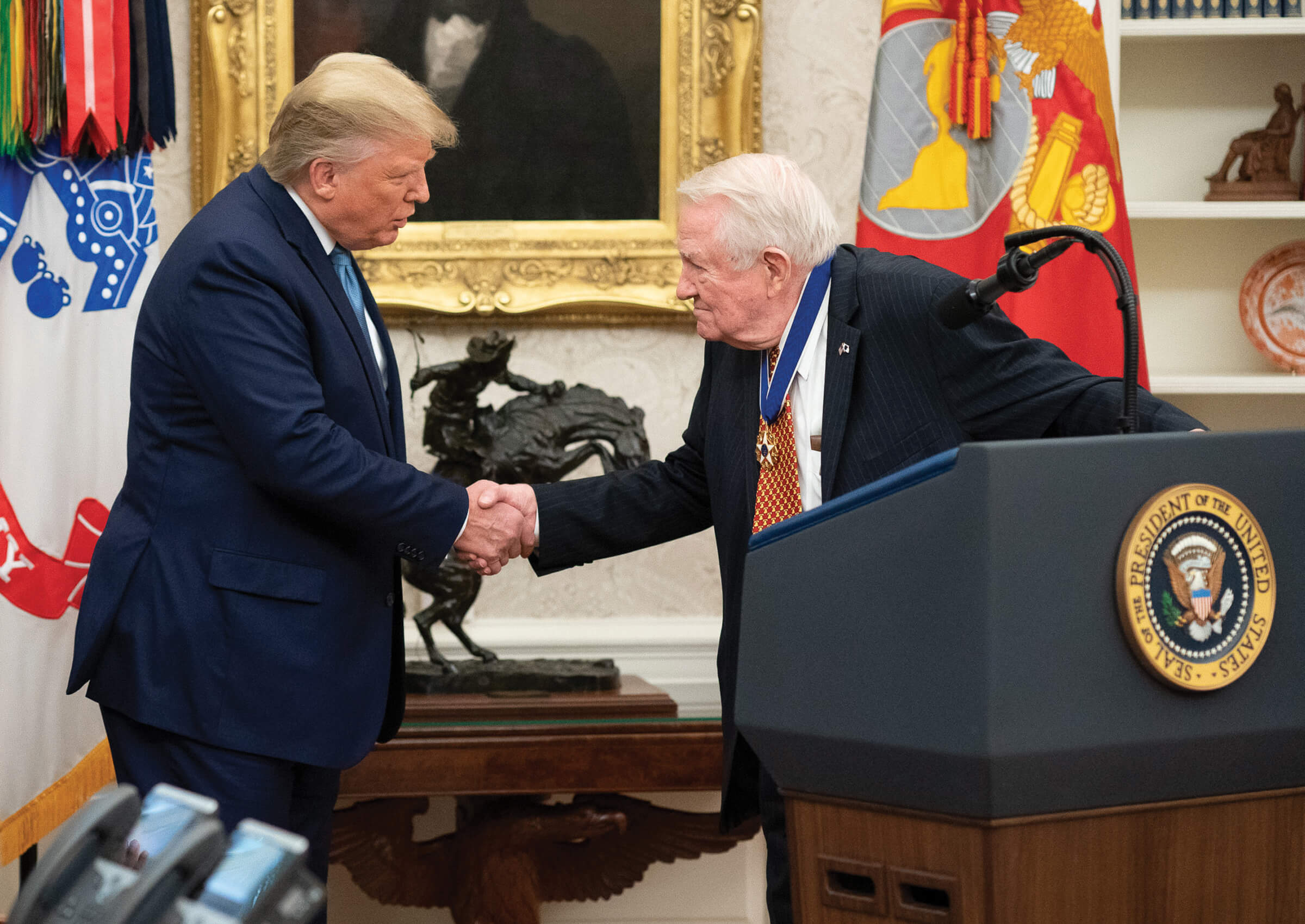
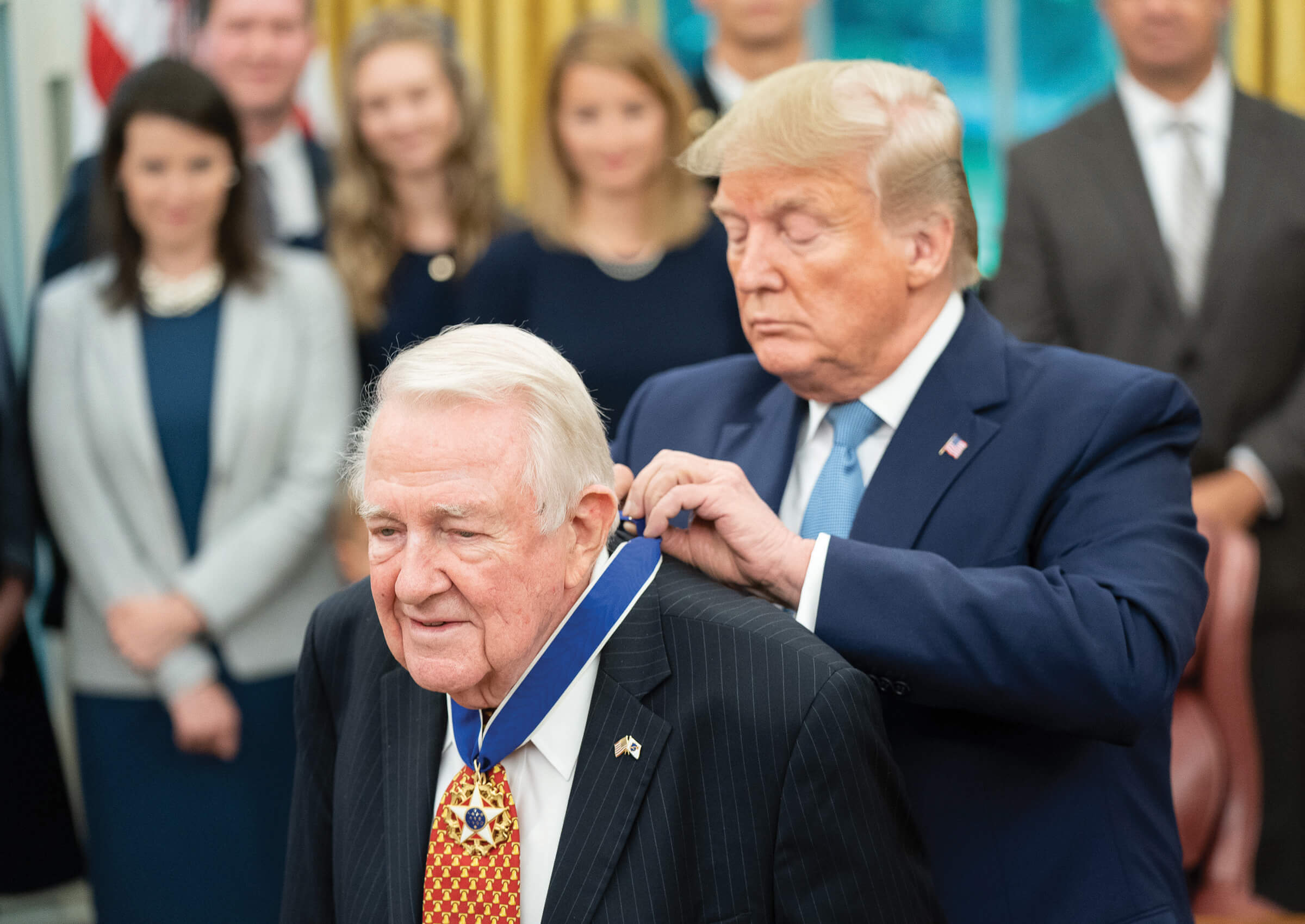
Edwin J. Meese III, Heritage’s Ronald Reagan distinguished fellow emeritus, was awarded the Presidential Medal of Freedom by President Trump in an October ceremony at the White House.
In 1985, Edwin J. Meese III, the 75th U.S. attorney general, did something no attorney general had done since the days of FDR: he questioned how the Constitution ought to be interpreted and asserted that the executive branch had a legitimate role to play in “shaping the form of jurisprudence.”
